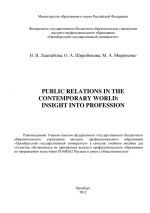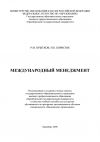Правообладателям!
Представленный фрагмент книги размещен по согласованию с распространителем легального контента ООО "ЛитРес" (не более 20% исходного текста). Если вы считаете, что размещение материала нарушает ваши или чьи-либо права, то сообщите нам об этом.Читателям!
Оплатили, но не знаете что делать дальше?
Текст бизнес-книги "Public Relations in the contemporary world: Insight into Profession"
Автор книги: Ольга Широбокова
Раздел: Иностранные языки, Наука и Образование
Текущая страница: 2 (всего у книги 2 страниц)
3 Books
1 . Read and translate the text.
Books
Despite fears that the so-called electronic media – especially radio, television, and videos – might damage book publishing, the opposite seems to be true. Book sales since the introduction of television have increased considerably, well beyond the increase in population. In fact, the U.S. leads in the number of books read per capita. These books range from the most recent best seller or biography to histories, gardening and cookbooks, or technical volumes and encyclopedias. Several reasons have been offered to account for this fact. First, American schools have traditionally stressed and tried to develop a "love of reading", to make it a habit. This general educational emphasis has been successful. One notes how many people are reading hooks – not only newspapers or magazines – in city buses, airports, during: lunch breaks, or on the beach. Secondly, public libraries have always been very active in communities throughout the country. Here, too, the general policy has been to get books to people rather than to protect the books from people. A favorite way of raising money for libraries is to have thousands of used books donated by the community and then to have a book sale ("Any five for $11"). The money made in this fashion goes to buy new books for the library. Such popular community fund-raising activities also increase the feeling among people that the library is theirs. The third and probably most important reason is that there are no laws which protect book sellers or fix prices. Anyone can sell new and used books at discount and sale prices, and just about everyone does. Very early, books were sold every where, in drug stores and supermarkets, department stores and 24-hour shops, through book clubs and by colleges, as well as in regular book stores. Many university book stores are student-owned and run. They operate on a nonprofit basis, that is, all profits go towards keeping the prices of books down, for paying the student employees, and often to support student scholarships and other financial aid. Then, there are the large "paperback supermarkets* located in most shopping centers, which sell mainly paperback books on a variety of subjects. These, too, have done a great deal to keep the book trade healthy and growing. Nationwide radio and television shows, new movies, and filmed versions of books have often helped to create spectacular book sales.
2 . Transcribe and translate the words below.
Television, per capita, considerably, to range, biography, technical, encyclopedia, to account, emphasis, magazines, throughout, to increase, law, discount, to operate, nonprofit, employees, to support, scholarship, financial, aid, variety, trade, healthy, growing, nationwide, version, to create, spectacular.
3 . Find in the text the English equivalents of the following words and expressions and read them out.
Продажа книг, увеличение населения, на душу населения, биография, энциклопедия, традиционно, обращать особое внимание, книги со скидкой, супермаркеты, где продаются книги в бумажном переплете, эффективные распродажи книг.
4. Fill in the gaps using one of these words.
1. These books… from the most recent best seller or biography to histories.
2. Several reasons have been offered to … for this fact.
3. A favourite way of raising money for libraries is to have thousands of used books … by the community and then to have a book sale.
4. Anyone can sell new and used books … and sale prices.
5. Then there are the large … located in most shopping centers. (range, to account, donated, at discount, paperback supermarkets).
5 . Fill in the prepositions.
1. In fact the U.S. leads … the number of books per capita.
2. Several reasons have been offered to account … this fact.
3. A favourite way of raising money for libraries is to have thousands of used books donated … the community and then to have a book sale.
4. Then, there are the large “paperback supermarkets” located … most shopping centers, which sell mainly paperback books on a variety of subjects.
5. Secondly, public libraries have always been very active … communities … the country. (in (3), by, for, throughout).
6 . Read the definition and say it in one word
1. The people who live in an area.
2. To give something such as money or goods to an organization, esp. to a school, hospital, political party.
3. A reduction in the price of smth.
4. Money that you make by selling smth., or from your business especially the money that remains after you have paid all your business costs.
5. Someone who is paid regularly to work for a person or an organization.
6. Extremely impressive.
7. In all parts of a country.
A collection or number of people, things, ideas ets. that are all different from one another. (community, donate, discount, profit, employee, spectacular, nationwide, variety).
7 . Prepare 3 sentences in Russian with the words from ex.5 for your group mates to translate
8 . Answer the following questions
1. Why have the books sales increased considerably since the introduction of television?
2. What is the range of books which are read by people?
3. What are the principal reasons of the increase of reading?
4. What do you know about new American system of development of “love of reading”? Is it successful?
5. Do libraries take an active part in the development of “love of reading”?
6. What can you say about the laws which protect book sellers or fix prices? Are they necessary in your opinion?
7. What is the basic role of mass media in the books’ sale?
4 Magazines
1 . Read the proper names and titles and say what you know about them.
If they are unknown for you, find some information in the text.
National Geographic
Reader’s Digest
Cosmopolitan, Vogue
Time
Newsweek
Scientific American
Psychology Today
U.S. News and World Report
The Atlantic Monthly
Harvard Educational Review
Saturday Review
The New Republic
National Review
Foreign Affairs
Smithsonian
The New Yorker
2 . Read and translate the text
There are over 11,000 magazines and periodicals in the United States. More than 4,000 of them appear monthly, and over 1,300 are published each week. They cover all topics and interests, from art and architecture to tennis, from aviation and gardening to computers and literary criticism. Quite a few have international editions, are translated into other languages, or have "daughter" editions in other countries. Among the many internationals are National Geographic, Reader's Digest, Cosmopolitan, Vogue, Time, Newsweek, Scientific American, and Psychology Today.
The weekly newsmagazines – the best known are Time, Newsweek, and U.S. News & World Report – serve as a type of national press. They also have considerable international impact, above all Time. This newsmagazine appears each week in several international editions. There are some for various parts of the United States, for the Far East, for Australia, for Europe, and so on. Time claims that although the advertising changes in each edition, the content remains the same internationally. This is not quite true: in the U.S. editions, for instance, there is no section called "European Notes." In any case, no other single news publication is read so widely by so many people internationally as is Time.
There are two other reasons why Time has such international influence. First, several other newsmagazines were modeled on Time. Among these are the leading newsmagazines in France, Germany, and Italy. Secondly, Time also sells news, news features, interviews, photographs, graphics, and charts to other publications throughout the world. Feature stories that first appear in Time are therefore echoed in many other publications in many other countries.
The newsmagazines are all aimed at the average, educated reader. There are also many periodicals which treat serious educational, political, and cultural topics at length. The best known of these include The Atlantic Monthly, Harvard Educational Review, Saturday Review, The New Republic, National Review, Foreign Affairs, Smithsonian, and, of course, The New Yorker. Such widely read periodicals, along with the hundreds of professional journals, provide a broad and substantial forum for serious discussion. Again, a lot of what first appears in these publications is often reprint internationally or in book form. Many of the long The New Yorker essays, for example, have later appeared in shortened form in publications such as England's The Observer Magazine or Germany's Die Zeit.
There is a strong market for such serious publications. National Geographic has an average circulation of over 10 million, Consumer Reports some 3 million, Smithsonian (published by the Smithsonian Institution in Washington D.C.) over 2 million copies, Scientific American (U.S. edition) over 700,000, and Saturday Review – and The New Yorker over half a million each. More popular and less demanding publications, such as Family Circle, Woman's Day, or National Enquirer, of course, have a huge readership and sell over 4.5 million copies of each issue. Altogether, there are about 60 magazines in the United States that sell over 1 million copies per issue each, and roughly the same number with more than 500,000 copies per issue.
3 . Translate and transcribe the following words and expressions, learn them by heart. Find the sentences where they were used and write them out.
Magazine, periodical, to publish, topic, criticism, edition, weekly, considerable, impact, various, to claim, content, for instance, single, reason, influence, leading, graphics, throughout, to echo, average, political, substantial, discussion, essay, to shorten, publication, circulation, to demand, readership, issue.
4 . Fill in the gaps using the words from the given below. Change the form if necessary.
Daughter edition, to claim, average, discussion, publication, issue, various, content, edition, criticism.
1. Many international newspapers and magazines have … in different countries of the world.
2. The editors … that the topics of the articles remain the same rarely, but the general idea of the magazine never changes.
3. The magazines for women are aimed at an … woman, depending on her style of life only.
4. Professional journals provide the readers with the field for serious … about the topics of interest: business, finance, politics or other.
5. The … of the story about a poor African family was banned because of the false facts: the journalist opened his secret to his colleague and then the truth was discovered.
6. Every … of this magazine contains information about the celebrities, popular movies, music and other information.
7. You can’t judge a person by the type of the magazine he buys from time to time: people change their mind often and choose … subjects.
8. He never liked the … of popular magazines, in fact he considered it all waste of time and money.
9. If you want to be in staff of … of a popular newspaper, you should know at least two foreign languages and be a skillful journalist.
10. Few editors can stand …: they can follow the advice of journalists of a higher rank or their experienced colleagues.
5. Match the definitions with the words.

6 . Answer the questions.
1. Do the newspapers differ, depending on how often they are issued? What is the reason for this division?
2. What topics do the American newspapers cover?
3. Are they national American editions?
4. What means “daughter” edition? Do Russian newspapers or magazines have such editions?
5. What are the most famous American newsmagazines?
6. What kind of impact does Time have? Does it have any “daughter” editions?
7. What can you say about the content of Time?
8. Is this newspaper the same all over the world?
9. Are there any reasons for such influence of Time?
10. Where does it have its copies?
11. What is the usual reader of the newsmagazines?
12. What do the professional periodicals provide?
13. Do the articles from these newsmagazines appear in any other form?
14. What is the usual circulation for these newsmagazines?
7 . Translate the following phrases. Pay attention to the use of prepositions. Find the sentences where they were used in the text and read them out. To translate into a language To be modeled on Time To be aimed at the average reader To provide a forum for serious discussion To sell over 1 million copies per issue.
8 . Fill in the proper prepositions.
1. According … the statistics, most European magazines were modeled… time.
2. All newspapers have their own readers: … example, Cosmopolitan is aimed … a fashionable single woman.
3. Cheap newspapers sell … million copies daily.
4. Most international editions are translated … foreign languages … order to provide the reader … the most important information worldwide.
5. Such serious periodicals as New Yorker or Time provide a forum … serious discussions … the eternal problems … economics, finance, politics and culture.
9 . Comment on the following quotations:
Find out who the quotes’ authors are and be ready to share the information with your groupmates. Pay attention to some useful formulas in Exercise 10 used when contrasting your ideas, guessing, disagreeing and saying “No” nicely.
Richard Stengel
“They are learning while they are doing which is how young people are learning today, and I think it’s a fantastic place for them”.
David Remnick
“98 % of the people who get the magazine say they read the cartoons first – and the other 2 % are lying”.
“What stores are around, what stores aren't around, what advertisers want to present as an ideal woman or man, passing prejudices, things that you would never say now that you could say then”.
Chris Johns
“We want you to find stories that are relevant, [that] you can apply directly to your life. Surprising, in-depth, contextual stories that help us make good decisions about the future”.
Kate White
“We try not to be all things to all women. You'll never find anything about babies in our magazine, except what a single reader might be interested in.”
10 . Useful Formulas
Saying 'No' Nicely
Sometimes you need to say no when someone makes a suggestion, offers something or asks you to do something for them. Of course, saying just 'no' can be rather rude. Here are some of the most common ways to say 'no' nicely – or at least not rudely. Would you like to see a film tonight?
I'm afraid I can't go out tonight.
I've got a test tomorrow.
Sorry, but I don't particularly like Chinese food.
I'd really rather not take a walk this afternoon.
Would you like to come to the museum with us?
Thank you, but it's not my idea of a fun afternoon out.
Let's go for a drive Sorry, I'm not really fond of driving for the fun of it.
Why don't you stay the night?
That's very kind of you, but I really have to get back to the city.
NOTE: Notice how we often say 'thank you' in some way before refusing the offer. When someone makes an offer it is polite to first thank that person and then say no, often offering an excuse for not wanting or being able to do something. Just saying 'no' is considered very rude behavior indeed!
Disagreeing
Here are a number of useful phrases used when disagreeing or expressing another opinion. Notice that a number of these expressions employ the first or second conditional.
I wouldn't do that. I would…
But if we…
I'm afraid I have to disagree with you.
Don't get me wrong, …
Even so, if…
Don't forget that…
Very true, but…
Examples:
I wouldn't do that. I'd speak to the teacher first and see what she says. But if we don't make those investments, we'll risk losing market share. Don't get me wrong, I just think we should look at some other options before making a decision.
Even so, if we change classes this late, we might not get a passing grade. Don't forget that you still need to finish all your homework BEFORE you can do that. Very true, but we still need to get the garden in shape before building a new deck.
Contrasting Ideas
There are a number of formulas used when contrasting ideas in English. Here are some of the most common:
We'd love to stay for dinner, but we have got to get going.
They decided to stay in the area, in spite of their problems with the local residents. Despite the difficulties of a long journey, Peter decided to visit India.
Getting a good job is hard work, however, most people eventually find one with patience. There were a number of people who came, although the hotels were not equipped to handle them all.

Guessing
There are a number of ways to guess in English. Here are some of the most common:
• I'd say he's about ready to quit his job.
Конец ознакомительного фрагмента.
Текст предоставлен ООО «ЛитРес».
Прочитайте эту книгу целиком, купив полную легальную версию на ЛитРес.
Безопасно оплатить книгу можно банковской картой Visa, MasterCard, Maestro, со счета мобильного телефона, с платежного терминала, в салоне МТС или Связной, через PayPal, WebMoney, Яндекс.Деньги, QIWI Кошелек, бонусными картами или другим удобным Вам способом.
Внимание! Это ознакомительный фрагмент книги.
Если начало книги вам понравилось, то полную версию можно приобрести у нашего партнёра - распространителя легального контента ООО "ЛитРес".Правообладателям!
Представленный фрагмент книги размещен по согласованию с распространителем легального контента ООО "ЛитРес" (не более 20% исходного текста). Если вы считаете, что размещение материала нарушает ваши или чьи-либо права, то сообщите нам об этом.Читателям!
Оплатили, но не знаете что делать дальше?







